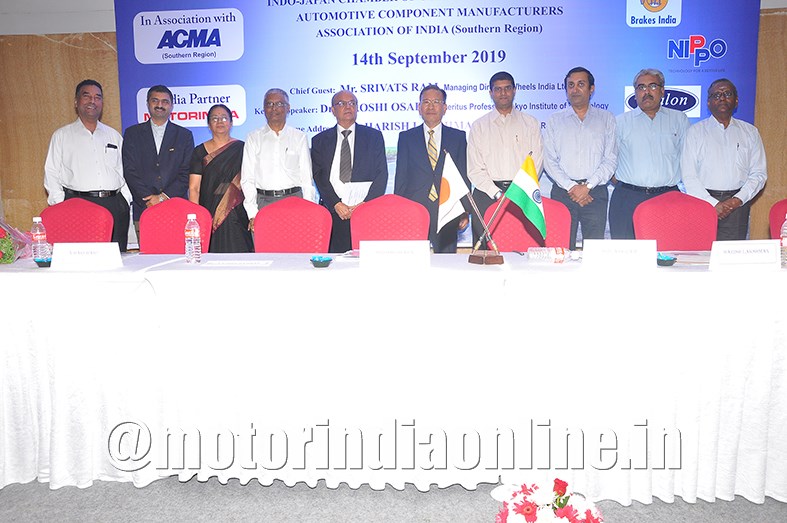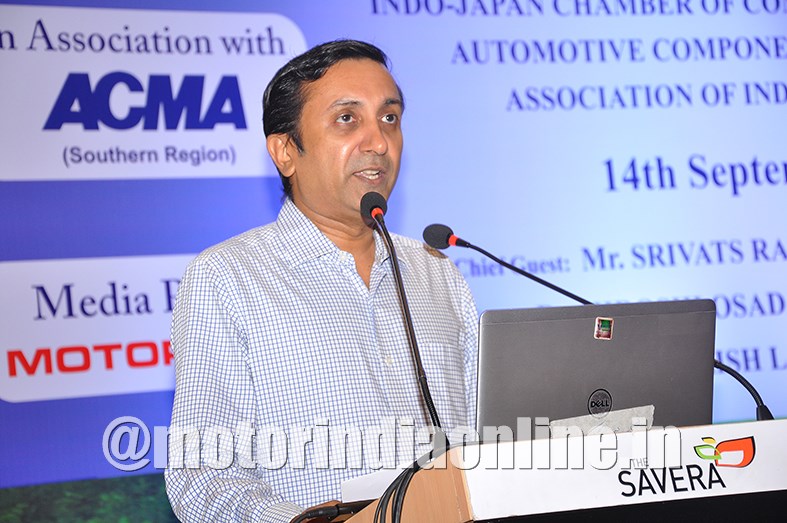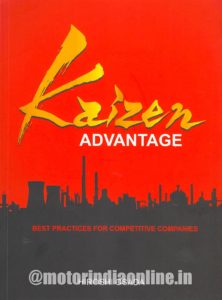R. Natarajan, Managing Editor and Publisher, MOTORINDIA, writes about a seminar organised by the Indo-Japan Chamber of Commerce and Industry in association with the Automotive Components Manufacturers Association of India that focused not only on how collaborations between Japan and India can boost the Indian automotive sector but also on how TQM plays a significant role in global acceptance of products

The automotive sector of India is one of the largest in the world, contributing 50% to the country’s manufacturing GDP. Among the various factors which drive the growth of the Indian automotive sector is the adoption of Total Quality Management (TQM) in the manufacturing operations. Today, TQM is more essential to every automotive manufacturer, particularly for exporting to developed countries. Globally, Japanese companies have been rated the best due to continuous practice of TQM.
Against this backdrop, the Indo-Japan Chamber of Commerce and Industry (IJCCI) in association with the Automotive Components Manufacturers Association of India (ACMA) organised a seminar on ‘Potentials and Prospects of Japan-India Cooperation in Automotive Industry’ on September 14, 2019 in Chennai. The seminar turned out to be the right platform for the automotive component manufacturers to understand and associate themselves with a roadmap to quality management while treading the path of the mentor.
T.P. Imbichammad, President, IJCCI, and Chairman, Avalon Group, welcomed the gathering. Harish Lakshman, Vice Chairman, Rane Group, in his theme address, spoke about their company’s TQM journey which has won them five Deming Prizes and three Grand Prizes. India and Japan have been friends for a long time in both business and cultural activities. During 2017-18, the bilateral trade between the two countries touched $15.7 billion which was an all-time high. Hence, there is vast scope for widening the economic relationship between India and Japan.

“During the last 25 years, the Indian automotive sector has been transformed by the implementation of TQM in a big way. Already, major automotive companies, including TVS Group, Rane Group, JSW, etc., are focusing intently on the practice of TQM in order to make the products conform to world standards. It was in 1990, when the liberalisation era started in India, that automotive companies realised the need for improvement in quality for sustained development and it has paid off well,” said Harish.
Srivats Ram, Managing Director, Wheels India Ltd., who was the chief guest on the occasion, in his address, said: “Japan has been a trade partner with India for several years. For instance, in 1938 when TVS Company used to run buses, they did scrap business by selling horseshoes which used to have steel imported from Japan. With the birth of Maruti Suzuki in India, Japanese companies have entered India in a big way. Today, Maruti Suzuki has started a cluster programme with 13 companies to practice TQM. Meanwhile, the ACMA Centre for Technology (ACT), which serves around 1,000 companies, imparts basic knowledge of TQM.”
While referring to his own company, Wheels India Ltd., Ram pointed out that it was in the year 2000 that the company started exporting components mainly to earthmoving and construction equipment manufacturers in Japan. Two years back, Wheels India formed a joint venture with Topy Industries of Japan, which is progressing well. With Indian companies focusing more and more on quality, it has offers huge potential, next to China. Also, there are a lot of Japanese companies in India that have expanded their operations due to increasing domestic demand.
Today, India has become a value-for-money market, particularly for the producers of small cars. Even though China has been a low-cost source for automotive products, the ongoing US-China tariff war can be a greater opportunity for Japanese companies to look at India, especially for the sourcing of low-cost parts. Japanese companies can also utilise the technically skilled workforce largely available in India. In areas of new technologies like hybrid and India’s aspiration to go electric, Japan and India can definitely work together.
India’s distinction in Deming Prize
Dr. Hiroshi Osada, Professor Emeritus, Tokyo Institute of Technology, made a detailed presentation on the definition of TQM, the advantage of winning the Deming Prize, etc. Interestingly, out of 252 companies that have won the Deming Prize till 2018, India has the distinction of being the second-highest country with 32 Deming Prize winners next only to Japan which has a record number of 197 Deming Prize companies. The other Deming Prize winning nations include Thailand with 12, USA with four and Taiwan with three. It was in 1998 when Sundaram Clayton Ltd. of TVS Group became the first Indian company to win the Deming Prize.
Rajesh Raghavan, President, Rane NSK Steering Systems (P) Ltd. and N. Balakrishnan, President, Sundram Fasteners Ltd. – both being Deming Prize winners – shared their company’s TQM journey with a detailed presentation.
A women power
IJCCI is a service organisation engaged in strengthening Japan-India cooperation in education, culture and economic activities between the two countries for the last 30 years. Suguna Ramamoorthy, IJCCI’s Secretary General, has been the driving force for taking the bilateral relationship between the two countries to higher levels. She has immense knowledge about economy, trade and commerce.
